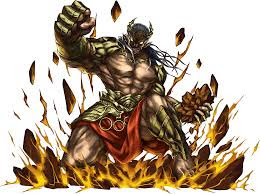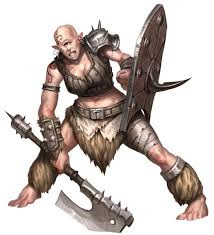THE TITANS were the first children of Mother Earth. They were the first gods, taller than the mountains she created to serve them as thrones, and both Earth and Sky were proud of them. There were six Titans, six glorious gods, and they had six sisters, the Titanesses, whom they took for their wives.
When Gaea again gave birth, Uranus was not proud. Their new children were also huge, but each had only one glowing eye set in the middle of his forehead. They were the three Cyclopes and they were named Lightning, Thunder, and Thunderbolt. They were not handsome gods, but tremendously strong smiths.
Sparks from their heavy hammers flashed across the sky and lit up the heavens so brightly that even their father's stars faded.
After a while Mother Earth bore three more sons. Uranus looked at them with disgust. Each of them had fifty heads and a hundred strong arms. He hated to see such ugly creatures walk about on lovely Earth, so he seized them and their brothers the Cyclopes and flung them into Tartarus, the deepest, darkest pit under the earth.
Mother Earth loved her children and could not forgive her husband for his cruelty to them. Out of hardest flint she fashioned a sickle and spoke
to her sons the Titans:
"Take this weapon, make an end to your father's cruelty and set your brothers free."
Fear took hold of five of the Titans and they trembled and refused. Only Cronus, the youngest but the strongest, dared to take the sickle. He fell upon his father. Uranus could not withstand the weapon wielded by his strong son and he fled, giving up his powers.
Mother Earth made Pontus, the boundless seas, her second husband, and from this union sprang the gods of the watery depths. And from her rich ground grew an abundance of trees and flowers and, out of her crevices, sprites, beasts, and early man crept forth.
 |
| Titans |
 |
| Cyclopes |
After a while Mother Earth bore three more sons. Uranus looked at them with disgust. Each of them had fifty heads and a hundred strong arms. He hated to see such ugly creatures walk about on lovely Earth, so he seized them and their brothers the Cyclopes and flung them into Tartarus, the deepest, darkest pit under the earth.
Mother Earth loved her children and could not forgive her husband for his cruelty to them. Out of hardest flint she fashioned a sickle and spoke
to her sons the Titans:
"Take this weapon, make an end to your father's cruelty and set your brothers free."
Fear took hold of five of the Titans and they trembled and refused. Only Cronus, the youngest but the strongest, dared to take the sickle. He fell upon his father. Uranus could not withstand the weapon wielded by his strong son and he fled, giving up his powers.
Mother Earth made Pontus, the boundless seas, her second husband, and from this union sprang the gods of the watery depths. And from her rich ground grew an abundance of trees and flowers and, out of her crevices, sprites, beasts, and early man crept forth.

Comments
Post a Comment